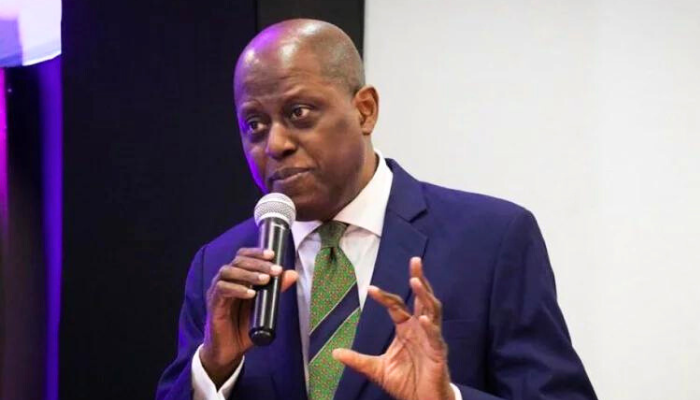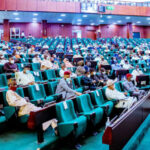The Central Bank of Nigeria, under the leadership of Olayemi Cardoso, has continued to raise interest rates, otherwise known as Monetary Policy Rates (MPR), which is the benchmark rate for borrowing by commercial banks in the country.
Daily Trust reports that President Tinubu appointed Olayemi Cardoso as the CBN governor in September last year and subsequently the chairman of the monetary policy committee in February this year.
At its first meeting since the resumption of Cardoso as governor, the CBN has jacked up interest rates by 400 basis points to a record 22.75% from 18.75% and has continued in that trajectory till date.
The recent hike shows that in the last seven months of resumption of the CBN Monetary Policy Committee, interest rates have been raised by 850 basis points.
- Invest in cybersecurity, firm tells business owners
- Cardoso calls for more investments, climate initiatives for Africa
Last week, at its Monetary Policy Committee (MPC) meeting, the CBN again raised the interest rate by 50 basis points to 27.25 per cent, making it the fifth hike since February 2024.
The announcement came as a shock to many financial analysts who had expected that the MPC would halt further tightening following the consecutive slow in inflationary figures as announced by the National Bureau of Statistics (NBS).
Timeline of interest rate hike: Feb – Sept 2024
A breakdown of interest rate hikes by Daily Trust shows that in February 2024, the MPC of the CBN increased the benchmark interest rate by 400 basis points to a record 22.75%.
Cardoso also stated that the committee voted to adjust the asymmetric corridor around the MPR from +100 to -700 from plus 100 to -300 basis points and raised the cash reserve ratio from 32.5 per cent to 45 per cent.
In March, the CBN further increased the MPR by 200 basis points; from 22.75 per cent to 24.75 per cent.
The CBN governor said the committee raised the MPR by 200 basis points to 24.75 per cent, and retained the asymmetric corridor at +100 basis points and -300 basis points around the MPR.
He said the committee also retained the Cash Reserve Ratio (CRR) at 45 per cent and the liquidity rate at 30 per cent.
Subsequently, in May, the MPC of the CBN increased the benchmark interest rate by 150 basis points from 24.75 per cent to 26.25 per cent.
It, however, retained the asymmetric corridor around the MPR to +100/-300 basis points, the cash reserve ratio of Deposit Money Banks (DMBs) at 45 per cent, as well as the liquidity ratio at 30 per cent.
In July, the committee raised the interest rate by 50 basis points from 26.25 per cent to 26.75 per cent.
The MPC also pegged the Cash Reserve Ratio (CRR) for DMBs at 45%, while that of merchant banks was put at 14%. The liquidity ratio was pegged at 30%.
At its last meeting in September, the MPC further jacked up the interest rates by another 50 basis points from 26.75 per cent to 27.25 per cent.
Under Cardoso’s leadership, the CBN has taken decisive steps to ensure that Nigerian banks are well-capitalised and resilient enough to support economic growth. Recognising the importance of robust capital buffers, the CBN announced in November 2023 that banks must meet new capital thresholds by March 2026.
Banks have been required to either issue new equity, merge with other institutions, or adjust their licenses to comply with the updated capital requirements.
CBN’s reason for tightening
At the last MPC meeting, Cardoso, while presenting the communique from the 297th meeting, told journalists that 11 of the 12-member committee present at the meeting approved the decision to further tighten the rates.
Cardoso announced that the MPC decided to raise the baseline interest rate also known as the MPR for the fifth consecutive time, by 50 basis points from 26.75 per cent to 27.25 per cent.
According to him, the MPC also raised the Cash Reserve Ratio (CRR) of DMBs by 500 basis points to 50 per cent from 45.00 per cent.
He added that “The Committee noted the moderation in headline inflation year-on-year in July and August. In addition, the MPC noted the relative stability and convergence in the exchange rate across the various market segments, resulting from the apex bank’s tight monetary policy stance.
“This is expected to improve confidence, which will enable economic agents to plan in the medium to long term.
“The MPC noted that even though headline inflation trended downwards due to a moderation in food inflation, core inflation has remained elevated, driven primarily by rising energy prices.”
The announcement by the CBN comes as the country’s inflation rate eased for the second consecutive month in August to 32.15 per cent, according to the NBS.
Experts warn against further tightening
Speaking on the issue, Senior Partner at SPM Professionals, Paul Alaje said, “The challenge we have here is that this policy is not impacting or is not achieving any result. The central bank ought to get it that we have had over 800 basis points increase this year, yet we have been trying to combat this very stubborn inflation that has remained heavy and has refused to come down as a result of policy injection.
“Subsequently, but you can’t increase rates without implications; the first implication is that it tends to crowd out investment, those who want to borrow from banks to invest may actually not be able to because the rates are going to increase.
“The second one is unemployment, and to corroborate the National Bureau of Statistics that reported an increase in unemployment rate to 5.3%. Although many may say it is low, you need to wait to know the methodology before you say it’s low but I think our unemployment figures are huge.
“The third implication is that for small businesses to have access to loans, it may be higher because even banks are affected.”
Also lending his voice on the issue, a development expert, Bashir Yahaya, said it is high time the MPC paused its monetary tightening regime as it is unfavourable for key sectors like manufacturing, real estate and Micro Small and Media Enterprises (MSMEs).
He said, “Already, rents are going high because of the cost of importing building materials, manufacturers are also crying as well as businesses because the banks are borrowing above the rooftop. If this trend of increasing rates continues by the CBN, then the collapse of economic activities is imminent
“There should be collaboration with the fiscal side to identify key issues affecting different economies and find a lasting solution rather than increase rates while inflation is showing signs of slowing.”

 Join Daily Trust WhatsApp Community For Quick Access To News and Happenings Around You.
Join Daily Trust WhatsApp Community For Quick Access To News and Happenings Around You.

